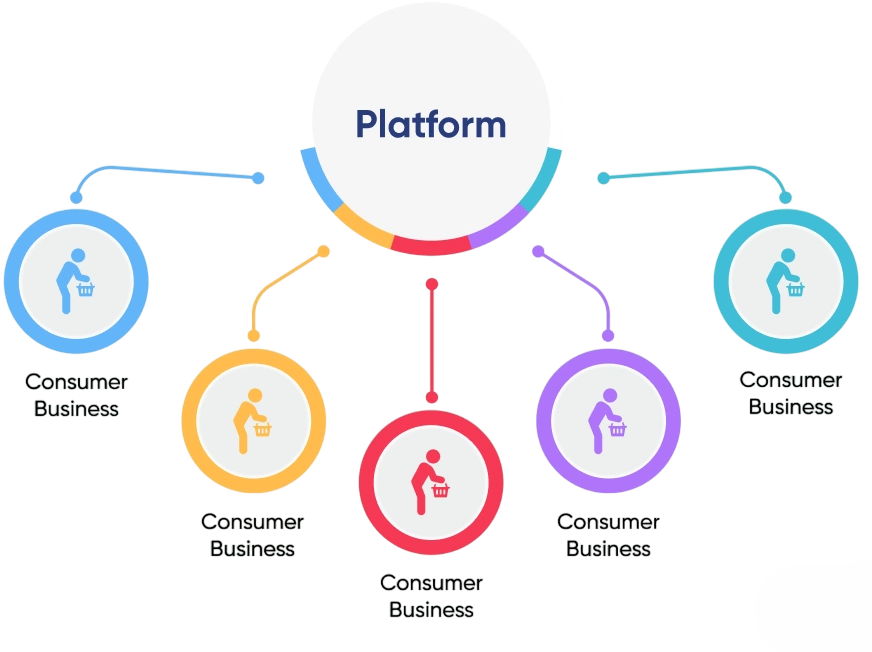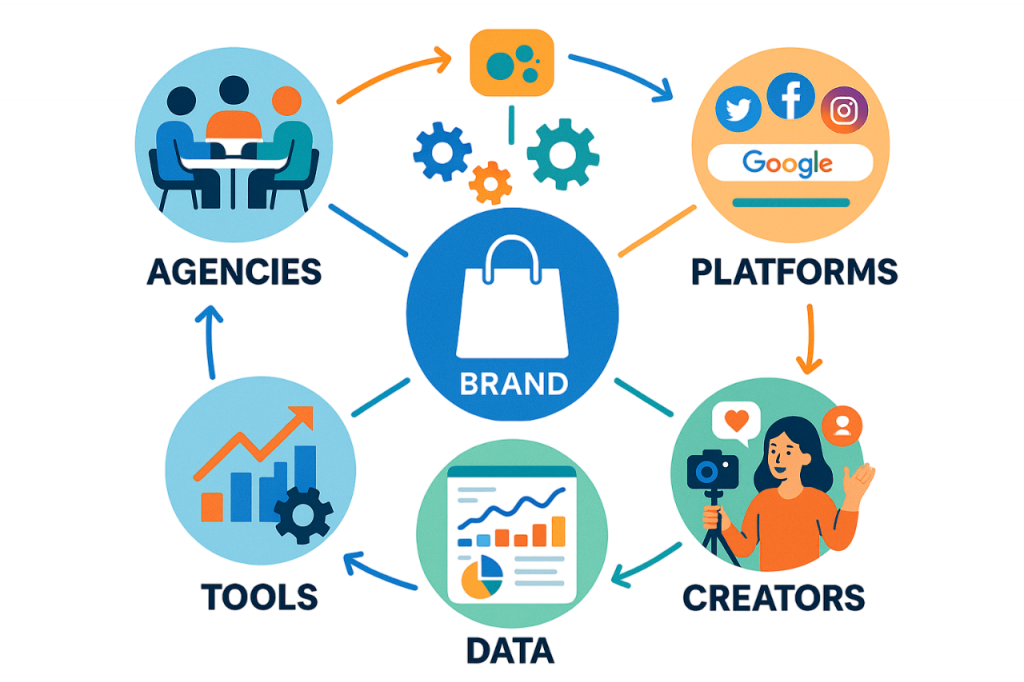
- Introduction to Social Media
- Social Media as a Lifestyle
- Platforms and Their Purposes
- Content Formats and Trends
- Communication and Engagement
- Marketing & Brand Building
- Measuring Social ROI
- Social Listening and Monitoring
- Ethics and Privacy
- Community Management
- Case Studies
- Future of Social Media
Introduction to Social Media
Umbrella Action in the context of social media refers to the collective influence and reach of digital platforms that facilitate the creation, sharing, and interaction of content among users. Initially developed for personal interaction, social media has now evolved into a powerful communication, marketing, and engagement tool an evolution explored in Digital Marketing Training, where professionals learn to harness platforms like Instagram, LinkedIn, and TikTok for brand storytelling, audience targeting, and real-time feedback. This transformation reflects a shift from passive consumption to active participation, making social media a cornerstone of modern digital strategy. With over 4.7 billion users globally, platforms like Facebook, Instagram, Twitter (X), LinkedIn, TikTok, and YouTube shape how people interact, share, and consume content in real-time. Through this umbrella action of interconnected platforms, social media connects individuals, communities, and brands like never before.
Ready to Get Certified in Digital Marketing? Explore the Program Now Digital Marketing Online Training Offered By ACTE Right Now!
Social Media as a Lifestyle
Social media is no longer just a pastime; it’s a part of daily life. People wake up to notifications, scroll through feeds during breaks, and engage in digital conversations around the clock. It influences decisions from shopping to voting and affects personal identity and social validation an expansive impact explored in Choose a Career in Digital Marketing, where professionals learn how targeted campaigns shape consumer behavior, public opinion, and brand perception. From personalized ads to influencer-driven narratives, digital marketing has become a cultural force that blends psychology, data, and storytelling to drive action and build trust. The integration of social media into daily routines has redefined relationships, culture, and even mental health. The rise of “digital natives” and the normalization of online presence across all ages has made social media a lifestyle, not just a platform.
Platforms and Their Purposes
Each social media platform serves a unique purpose an insight central to E-learning Content Deployment Considerations, where educators learn to leverage Facebook for community building, LinkedIn for professional discourse, YouTube for visual instruction, and Instagram for bite-sized engagement. By aligning platform strengths with learning objectives, course creators can enhance reach, interactivity, and learner retention across digital ecosystems.
- Facebook: Best for community building, ads, and events.
- Instagram: Visual content sharing, influencer marketing, and product promotion.
- Twitter (X): Real-time updates, customer service, and trending conversations.
- LinkedIn: Professional networking, B2B marketing, and thought leadership.
- TikTok: Short-form video content, viral trends, and Gen Z engagement.
- YouTube: Long-form video, tutorials, and educational content.

Choosing the right platforms depends on target audience, brand goals, and content type.
To Explore Digital Marketing in Depth, Check Out Our Comprehensive Digital Marketing Online Training To Gain Insights From Our Experts!
Content Formats and Trends
Social media thrives on diverse and evolving content formats—from short-form videos and ephemeral stories to interactive polls and carousel ads each offering unique engagement opportunities. These formats are critical touchpoints for paid campaigns, as explored in What does a PPC specialist do, where professionals learn to tailor ad creatives to platform-specific behaviors, optimize placements, and analyze performance across formats. Mastery of content diversity enables PPC specialists to maximize reach, relevance, and ROI in a fast-moving digital landscape.
- Images: High-quality visuals capture attention quickly.
- Videos: Live streams, reels, shorts, and explainer videos perform well across all platforms.
- Stories: Temporary content that boosts engagement and immediacy.
- Polls & Quizzes: Interactive tools for feedback and participation.
- User-Generated Content: Builds community and credibility.
- Memes: Infuse humor and relatability into messaging.
Trends evolve rapidly. As of 2025, short-form video, augmented reality (AR) filters, and AI-generated content formats are shaping user experiences.
Communication and Engagement
At its core, social media is about communication and engagement. Whether it is a brand sharing a story, a user posting an update, or a customer reaching out for support, the flow of information is continuous an omnichannel reality emphasized in Digital Marketing Training, where professionals learn to manage consistent messaging across platforms, foster real-time engagement, and respond to audience needs with agility. This dynamic exchange forms the backbone of modern marketing, requiring brands to be both storytellers and listeners in a constantly evolving digital landscape. Features like comments, shares, likes, direct messages, and stories enhance two-way communication. Real-time interaction builds community and trust. Brands that engage consistently and authentically foster stronger relationships and higher customer loyalty.
Looking to Digital Marketing Training? Discover the Digital Marketing Expert Masters Program Training Course Available at ACTE Now!
Marketing & Brand Building
Social media marketing is vital for brand visibility and audience growth. Businesses use it to increase awareness, generate leads, and drive conversions.

It offers a cost-effective alternative to traditional advertising while providing advanced targeting capabilities. Through influencer collaborations, user-generated content, and storytelling, brands can humanize themselves and create lasting impressions. Social proof, reviews, and engagement metrics act as modern-day word-of-mouth.
Measuring Social ROI
Return on Investment (ROI) in social media measures the value derived from activities relative to costs. Key performance indicators (KPIs) include engagement rate, click-through rate (CTR), conversion rate, and cost per acquisition metrics emphasized in Career Paths for Today’s SEO Specialist, where professionals learn to align SEO efforts with measurable business outcomes. Mastery of these KPIs enables specialists to optimize content, refine targeting, and demonstrate strategic impact across digital channels.
- Engagement Rate: Likes, shares, comments, and saves.
- Reach and Impressions: Number of users exposed to content.
- Click-Through Rate (CTR): User actions from content to links.
- Conversion Rate: Sign-ups, purchases, or leads generated.
- Follower Growth: Community size increases over time.
Tools like Google Analytics, Meta Business Suite, and third-party platforms like Hootsuite help analyze and improve social ROI.
Preparing for Digital Marketing Job Interviews? Have a Look at Our Blog on Digital Marketing Interview Questions and Answers To Ace Your Interview!
Social Listening and Monitoring
Social listening involves tracking conversations and mentions across social media to understand audience sentiment. It uncovers insights about brand perception, industry trends, and competitor strategies. Monitoring tools like Brandwatch, Sprout Social, and Mention enable businesses to respond in real-time, manage crises, and align content with audience needs.
Benefits include:
- Identifying brand advocates and critics
- Tracking sentiment changes
- Discovering content ideas
- Improving customer service
Ethics and Privacy
In today’s digital world, social media platforms are putting more emphasis on ethics and privacy as essential parts of a responsible user experience. As worries about data misuse and misinformation grow, companies are putting strategies in place to tackle major challenges. These efforts include strong data protection measures to keep user information secure and clear, while also highlighting user consent with straightforward permissions for newsletters, cookies, and ad targeting. Platforms are fighting authenticity issues by creating tools to stop fake followers and manipulated engagement initiatives reflected in Examples of Successful Rebranding, where brands like Instagram, LinkedIn, and Twitter have evolved their identity to prioritize transparency, trust, and ethical engagement. These rebrands go beyond aesthetics, embedding privacy-first design and authenticity safeguards into their core strategy.They are also focusing on mental health by adding features like content warnings and usage alerts. By giving users better privacy settings and protective measures, social media companies are showing their commitment to building safer, more trustworthy online spaces that respect individual privacy and support overall digital well-being.
Community Management
Umbrella Action in community management is a practice that goes beyond simple online interaction. It focuses on building active digital communities around a brand. By effectively moderating discussions, responding to user questions, and encouraging participation, community managers create engaging spaces that foster real connections an approach shaped by the History & Evolution of Digital Marketing, where the rise of social media transformed passive audiences into active participants. From early forums to today’s branded communities, digital marketing has evolved to prioritize interaction, loyalty, and shared value through real-time engagement. They use creative methods such as hosting interactive events, giveaways, and Q&A sessions to turn casual followers into loyal brand supporters. This umbrella action approach builds strong relationships with customers and also provides important feedback, allowing organizations to improve their products and services based on genuine user insights. A good community management strategy changes digital platforms from basic communication tools into lively, interactive communities that boost brand loyalty and meaningful engagement.
Case Studies
- Nike: Leveraged Instagram storytelling and influencer partnerships to drive engagement and sales.
- Wendy’s: Known for witty Twitter interactions, enhancing brand personality.
- Zomato: Used meme marketing and regional language content to connect with diverse audiences.
- Spotify: Personalized campaigns like Spotify Wrapped went viral, driving user interaction and shares.
These brands show that creativity, consistency, and audience understanding lead to successful social media strategies.
Future of Social Media
The future of social media is being shaped by AI-driven personalization, immersive AR/VR experiences, and integrated social commerce trends explored in Digital Marketing Training, where professionals learn to adapt strategies for evolving platforms. Short-form video dominance, influencer-led commerce, and virtual events are redefining how brands engage audiences, making continuous upskilling essential for staying competitive in this dynamic landscape.
- Artificial Intelligence: Personalized content curation and automated responses.
- Augmented and Virtual Reality: Immersive experiences like virtual try-ons and 3D product showcases.
- Decentralized Platforms: Blockchain-based networks giving users more control over data.
- Voice and Audio Social: Clubhouse and X Spaces highlight the growing demand for audio-first content.
- Sustainability and Purpose: Audiences favor brands with ethical and eco-conscious values.




